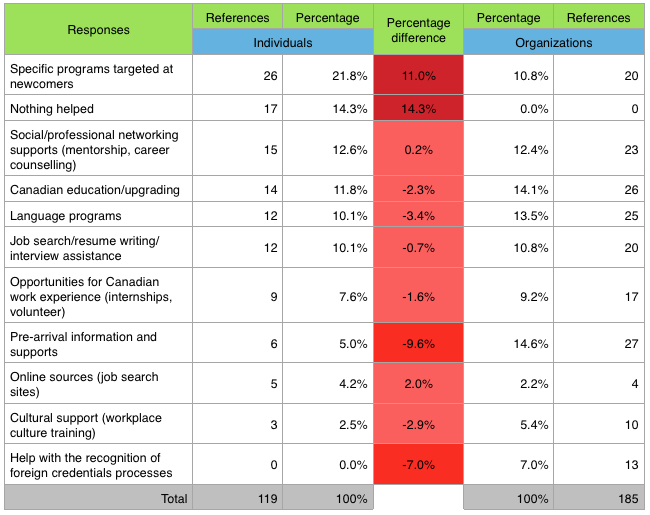Lack of Canadian work experience and recognition of foreign credentials are the main reasons why skilled immigrants continue to be chronically under employed, a new study by the Panel on Employment Challenges of New Canadians has found.
Led by immigrant advocate and social entrepreneur Nick Noorani, the panel met with over 150 organizations involved in the issue of employment for new Canadians and evaluated input from over 600 respondents to an online survey to explore why many skilled immigrants are stuck in survival jobs despite their qualifications.
In addition to issues related to work experience and education, inadequate pre-arrival information, employer bias and cultural shock are also preventing newcomers to find suitable jobs, the study reports.
A 2012 study by TD Bank concluded that if immigrant workers were employed at the same level as non-immigrant workers, there would be approximately 370,000 more people working.
Immigrants account for nearly half of all PhD holders and 40 per cent of master’s degree recipients in Canada, but many can’t find jobs in the professions for which they trained.
A 2012 study by TD Bank concluded that if immigrant workers were employed at the same level as non-immigrant workers, there would be approximately 370,000 more people working.
According to the Conference Board of Canada, that underutilization of skills costs the Canadian economy between four and six billion dollars a year.
In order to streamline the labour market integration process for new Canadians, the panel’s report has issued six recommendations
- To require each regulated occupation to develop a single pan-Canadian standard
- To require regulators to advise newcomers who are unsuccessful in the licensing process in finding an alternative career
- To foster a shared responsibility among all stakeholders for helping immigrants find jobs
- To establish an advisory group to monitor progress made in implementing the panel’s recommendations
- To provide immigrants with information that help them set realistic expectations about job prospects and licensing practices
- To educate communities on how to increase retention outside large metropolitan areas.
 What Migrants Need vs. What Support is Available
What Migrants Need vs. What Support is Available
One of the questions the panel asked during the online consultation was: “What practices, tools or programs have helped you, before and after you arrived in Canada, to get a job that made full use of your skills and experience?”
Individual respondents, most of them immigrants who have been living in Canada for five years or less, replied that “specific programs targeted at newcomers” was the most helpful support service. “Nothing helped” was the second most common response. (Results shown to the right.)
“[T]here’s a number of challenges and barriers to finding your way in the labour market in a new country.” – Dr. Sylvia Fuller, University of British Columbia
Organizations serving newcomers, on the other hand, responded that the most helpful programs for newcomers are “pre-arrival information and support” and “Canadian education/skills gap training”.
For Dr. Sylvia Fuller, an associate professor at University of British Columbia’s department of sociology, the discrepancies shown by the data are not surprising.
“One thing to keep in mind, of course, is that there’s a number of challenges and barriers to finding your way in the labour market in a new country,” she says. “So there isn’t kind of one real ranking, I would say.”
Fuller warns that there might even be significant differences in opinion among immigrants. Variables like their particular situation or the number of years they’ve been living in Canada can influence their views on what services are the most helpful. The report didn’t include specific conclusions regarding this data.
Noorani was unavailable for comment prior to this article’s deadline.
Better Support Services Needed
Experts agree that the panel’s recommendations are good measures to speed up and support job matching for immigrants. But they also warn that the social integration of newcomers needs to be taken into account, as issues like housing or childcare often prevent immigrants from focusing exclusively on job hunting.
“We know from numerous studies that the challenges to labour market integration include the family and life circumstances of the individual,” explains Dr. Peter Hall, an associate professor at Simon Fraser University’s urban studies program. “It would have been good to see even more emphasis on this dimension in the panel’s mandate, and hence in their recommendations.”
“If folks are having to work full time at crappy survival jobs and study in the evening, it’s going to take a while to get through the process. And we know that the faster the people go through [it], the better the outcomes.” – Dr. Sylvia Fuller, University of British Columbia
Immigrants also need better programs aimed to support them economically while they undergo the process of validating their professional credentials, Fuller argues. The process is often not only costly, but also time-consuming, as many newcomers are forced to undergo some level of training in order to comply with Canadian standards.
“If folks are having to work full time at crappy survival jobs and study in the evening, it’s going to take a while to get through the process,” she says. “And we know that the faster the people go through [it], the better the outcomes.”
“Maybe it makes you feel better that you hired somebody that’s a little bit like you, but it doesn’t mean you hired the best person.” – Abraham Asrat, Mosaic British Columbia
For Fuller, providing immigrants with funding to navigate through the licensing process and other challenges they face while looking for jobs will also allow more immigrant women to re-attain their professional status.
“Female immigrants are less likely to be able to re-attain their professional status than male immigrants,” she explains. “Part of that is that there tends to be this kind of family survival strategy where folks are taking [turns] to do this, and often the women are more focused on settling the children, or taking on the jobs so that the husband can study; all those kinds of things.”
The Employers’ Responsibility
Abraham Asrat, a manager of employment programs at Mosaic British Columbia, argues that native-born Canadians also have to realize that they play an important role in immigrants’ integration process into the workforce.
Employer bias against foreign credentials and experience is often the reason why newcomers are unable to become employed, he says.
“Employers, they feel like [it] is a risk assessment. ‘Am I going to hire somebody that went to UBC, that I know their education, or am I going to hire somebody that’s just from outside, I don’t know the university?’” he says.
“Maybe it makes you feel better that you hired somebody that’s a little bit like you, but it doesn’t mean you hired the best person.”




